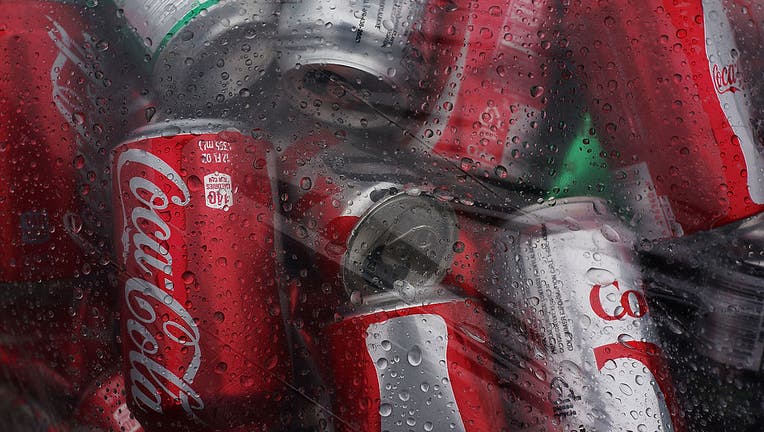Oregon's 'bottle deposit bill' was the first, but now it may be getting an overhaul

FILE - Cans of Coca-Cola and other beverages sit bundled for recycling at a bottle redemption center in Oregon, where lawmakers are considering changes to the state’s landmark bottle deposit law. (Photo by Spencer Platt/Getty Images)
After more than 50 years, Oregon’s groundbreaking bottle deposit law could soon look very different.
A new proposal seeks to update the state’s first-in-the-nation "bottle bill" by placing time limits on when bottles and cans can be returned, and by creating alternative redemption sites in cities like Portland.
The goal: ease tensions between community members, retailers, and those who depend on canning for income, as concerns mount about safety, drug use, and homelessness around some redemption centers.
While some praise the changes as necessary, others warn they may go too far—or not far enough.
Why is Oregon changing its bottle deposit law?
The backstory:
Oregon’s bottle bill, passed in 1971, was a landmark environmental law designed to reduce litter by giving consumers a small refund for every eligible beverage container returned. Initially set at 5 cents, the deposit rose to 10 cents in 2017, and the program expanded to include more types of containers.
The state now boasts the highest redemption rate in the country: 87% of containers were returned in 2023. Twenty-seven dedicated centers operate across Oregon, including facilities like The People’s Depot under a Portland bridge, where workers process tens of thousands of bottles each day.
What we know:
The new legislation aims to balance environmental goals with public safety by updating how and when containers can be returned across the state.
The proposed bill would:
- Allow all stores to stop accepting bottle returns after 8 p.m.
- Let Portland retailers limit or refuse hand-counted returns after 6 p.m.
- Introduce mobile redemption units and other nonprofit-run alternatives in urban areas.
- Enable some stores near these alternative sites to opt out of accepting returns altogether.
Retailers, including the Plaid Pantry convenience chain, support the changes, citing safety concerns linked to people redeeming containers late at night.
Residents like Monica Truax, who lives near a redemption center in Portland, told the AP her once-quiet neighborhood now faces ongoing issues with drugs, garbage, and violence.

FILE - Cans of Coca-Cola and other beverages sit bundled for recycling at a bottle redemption center in Oregon, where lawmakers are considering changes to the state’s landmark bottle deposit law. (Photo by Spencer Platt/Getty Images)
What we don't know:
It remains unclear how many mobile redemption sites will be created—or how soon. Lawmakers have also not finalized whether the state will redirect unclaimed deposit money, which critics say could fund environmental programs. In 2019 alone, the Oregon Beverage Recycling Cooperative (OBRC) retained over $30 million in unclaimed refunds.
What they're saying:
In written testimony, Kristofer Brown of The People’s Depot acknowledged the divide over the bill but said most people who redeem bottles rely on it to survive. "Since becoming manager of The People’s Depot, I’m learning how polarizing The Oregon Bottle Bill is," he said.
Jonathan Polonsky, CEO of Plaid Pantry, previously argued in The Oregonian/OregonLive that the system endangers employees by forcing them to accept late-night returns from people who may be under the influence or aggressive. He noted that a small number of cans can buy enough fentanyl to feed addiction.
Meanwhile, community members like Truax say the spirit of the original law has been lost: "It’s just a mess," she said.
Why you should care:
This isn’t just about recycling. For some, the 10-cent refund per bottle is a lifeline. For others, it’s a safety concern that threatens local businesses and neighborhoods. What happens in Oregon could influence other states with similar systems—and reshape the national conversation around environmental programs and social impact.
What's next:
The bill has already passed the Oregon Senate and is now in the House. Lawmakers have until late June to finalize the legislation.
The Source: This report is based on Associated Press reporting from Portland, Oregon. It includes direct quotes from residents, lawmakers, and stakeholders as presented in AP interviews and public testimony. Data from the Oregon Liquor and Cannabis Commission and a 2020 state audit of the bottle bill were also cited. This story was reported from Los Angeles.

